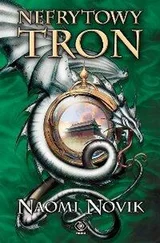“Come, walk with me,” Bonaparte said, and drew him by the arm down to the water, where Laurence was not himself required to walk, but rather to stand and let the emperor pace before him, gesturing, with a restless energy. “What do you think of what I have done with Paris?” he asked, waving his hand towards the sparrow-cloud of dragons visible, working on the new road. “Few men have had the opportunity to see my designs, as you have, from the air.”
“An extraordinary work, Your Majesty,” Laurence said, sorry to be so sincere; it was the kind of work which only tyranny, he supposed unhappily, could achieve, and characteristic of all Napoleon’s works, smashing through tradition with a kind of heedless forward motion; he would have preferred to find it ugly, and ill-reasoned. “It will expand all the character of the city.”
Bonaparte nodded, satisfied with this remark, and said, “It is only a mirror held up to the expansion of the national character, however, that I am going to achieve. I will not allow men to fear dragons: if cowardice, it is dishonorable; if superstition, distasteful; and there are no rational objections. It is only habit, and habit which can and must be broken. Why should Peking be superior to Paris? I will have this the most beautiful city of the world, of men and dragons both.”
“It is a noble ambition,” Laurence said, low.
“But you do not agree with it,” Bonaparte said, pouncing; Laurence twitched before the sudden assault, very nearly of palpable force. “But you will not stay, and see it done, though you have already been given proof of the perfidy, the dishonorable measures to which a government of oligarchs will stoop: it can never be otherwise,” he added; more declaration than an attempt to convince, “when money becomes the driving force of the state: there must be some moral power beneath, some ambition, that is not only for wealth and safety.”
Laurence did not think very much of Bonaparte’s method, which substituted an insatiable hunger for glory and power, at the cost of men’s lives and liberty; but he did not try to argue. It would have been hard indeed, he thought, to marshal any argument in the face of the monologue, which Bonaparte did not mind continuing in the absence of opposition or even response; he ranged widely across philosophy and economics, the useless folly of government by clerks, the differences, which he detailed minutely on philosophical grounds quite beyond Laurence’s comprehension, between the despotism of the Bourbons and his own imperial state: they had been tyrants, parasites, holding power through superstition and for their own personal pleasure, lacking in merit; he was the defender of the Republic, and the servant of the nation.
Laurence only withstood, as a small rock in a deluge; and the gale past said simply, “Your Majesty, I am a soldier, not a statesman; and I have no great philosophy but that I love my country. I came because it was my duty as a Christian and a man; now it is my duty to return.”
Bonaparte regarded him, frowning, displeased, a tyrant’s lowering look; but it flitted quickly away, then he stepped closer, and gripped Laurence by the arm, persuasive. “You mistake your duty. You would throw away your life: all right, you might say, but it is not yours alone. You have a young dragon, who has devoted himself to your interest, and who has given you all his love and confidence. What can a man not accomplish, with such a friend, such a councilor, free from any trace of envy or self-interest? It has made you who you are. Think where would you now be, without the stroke of fortune that put his heart into your keeping?”
At sea, like as not, or at home: a small estate in England perhaps, married, by now his first child here; Edith Woolvey, née Galman, had been delivered of her first four months before. Marching steadily up the post-list towards flag-rank; he would probably have been sitting presently on blockade, beating up and down off Brest or Calais, a tedious but necessary routine. A prosperous and an honest life, and if no great chance of glory, as far from treason as from the moon; he had never asked for anything else, or expected it.
The vision stood at a distance almost bewildering, now; mythical, softened by a comfortable blind innocence. He might have regretted it; he did regret it, now, except there was no room in the gardens of that house for a dragon to be sleeping in the sun.
Bonaparte said, “You do not suffer from the disease of ambition—so much the better. Let me give you an honorable retirement. I won’t insult you by offering you a fortune, only his keep and yours. A house in the country, a cattle-herd. Nothing will be asked of you that you do not want to give.” His hand tightened, when Laurence would have drawn away. “Will your conscience be more clear when you have delivered him into captivity? Into a long captivity,” he added sharply. “—they will not tell him when they put you to death.”
Laurence flinched; and through the grip Bonaparte felt it and pursued, as a breach in his lines. “Do you think they would hesitate to forge your name to letters? You know they will not, and in any case the messages will only be read aloud. A few words—you are well, you think of him, you hope that he is obedient—and he will be imprisoned by them better than iron bars. He will wait and linger and hope for many years, starved and cold and neglected, long after you have swung from a gibbet. Can you be satisfied to condemn him to it?”
Laurence knew all this sprang from a selfish concern: if Bonaparte could not have Temeraire’s active complaisance, even in the matter of breeding, he would still have been glad at least to deny him to the British; and he probably had hopes of persuading them, in time, to do more. That knowledge, cold and impersonal, gave Laurence no comfort; it did not matter to him that Bonaparte was interested, when he was very likely also right.
“Sir,” Laurence said unevenly, “I wish you may persuade him to stay.—I must go back.”
The words had to be forced. He spoke past a constriction, as one who has been running a race uphill, for a long time: since that moment in the clearing, since they had left London behind. But now the hill was past; he had reached the summit, and he stood there breathing hard; there was nothing more he had to say or bear; his answer was fixed. He looked over at Temeraire, waiting anxiously inside the open pavilion. He thought he would try and put himself in Temeraire’s hands, at least, rather than be marched back to prison; if he was killed in the attempt, it did not make much difference.
Bonaparte recognized it; he let go Laurence’s arm, and turned away from him to pace frowning up and down; but at last he turned. “God forbid I should alter such a resolve. Your choice is the choice of Regulus, and I honor you for it. You will have your liberty—you must have your liberty,” he said, “and more: a troop of my Old Guard will escort you to Calais; Accendare’s formation see you across the Channel, under flag of truce: and all the world will know that France at least can recognize a man of honor.”
The covert at Calais was busy: fourteen dragons were not easily put in order, and Accendare herself was inclined to snap and be difficult, irritable and weary with coughing. Laurence turned away from the confusion, and wished only, dully, to be gone; to have done with everything, all the hollow ceremony: eagles and flags, polished buckles, the fresh pressed blue of the French uniforms. The wind was fair for England; their party was expected, letters having traveled across and back to arrange the parley. There would be dragons and chains to meet them: perhaps even Jane, or Granby, or strangers who knew nothing more of him than his crime. By now his family surely would know all.
Читать дальше












